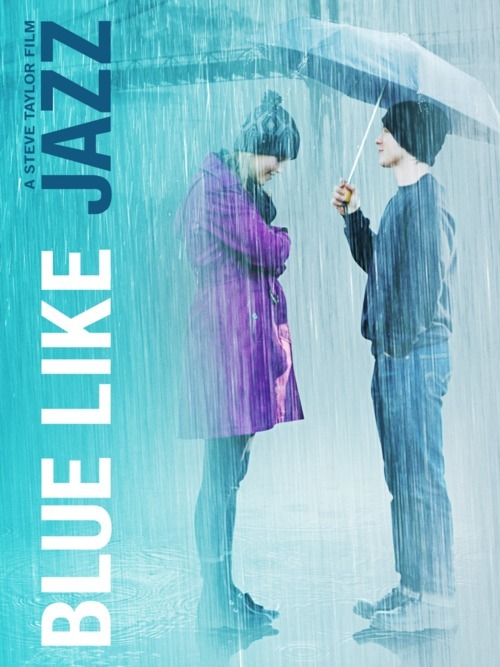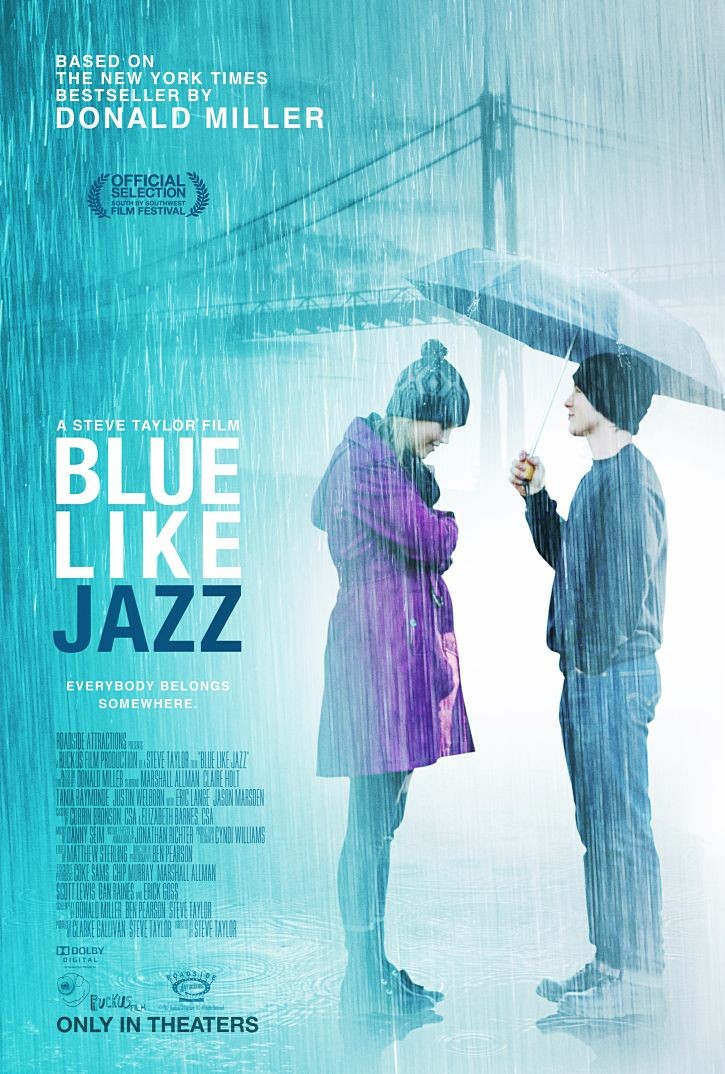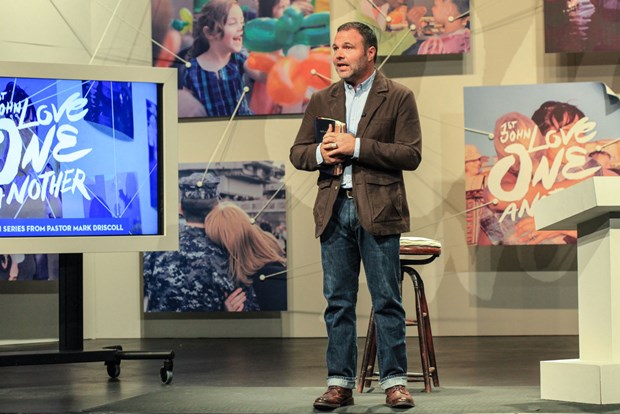Yep, still thinking about Blue Like Jazz. Difficult for me not to in some ways. I loved the book, supported the Kickstarter campaign, participated in several book studies with it and currently leading a Reading Circle on a Million Miles in a Thousand Years. If you are around Lexington, MA, we’ll be discussing Part 5 and the movie this Sunday night after GC@Night in the cafe – All are welcome.
It occurred to me halfway through my second viewing of BLJ, that I was enjoying the movie more this time around. Perhaps my expectations were tempered, maybe I was responding to all the negative reviews of the movie/project, or maybe I was a in a better frame of mind – I don’t know.
The negativity does crack me up. Though it’s not as bad as the Tebow deal, it’s become humorous how people are so quick to hate on this movie and on Don Miller and crew. A while back I saw someone commenting on Don’s body language during an interview. Come on dude, Don and his friends are out out promoting this movie city to city for the past 3 months, cut him/them some slack. The guy sold his house to help finance the project!
In some ways, Blue Like Jazz can’t be the movie to do what many of us want it to be. Primarily because it had become too big in the Christian subculture and Don is too popular of a writer to not have expectations for. the “first-responders of this movie” are going to be those fans (It will be interesting to see more from those who haven’t heard of the book). Many of us want this to be a conversation piece about God, spirituality, Christianity in general, many others want this to be a traditional tool of evangelism, others seem to want it to be an obscure piece of art floating like an astronaut in space.
Don’t get me wrong, there were a couple of things I didn’t like but I am glad it was made, glad it’s out there and I think Don, Steve and Ben did an amazing job, especially with what they had to work with.
My concerns are as follows: I was never really sold on the “inciting incidents” (thanks Don and Friends for giving us the language to critique your work) that led to Don’s collapse of faith and then the “bottoming out” scene that soon led to his repentance. If the movie was a true comedy, maybe the “youth pastor sleeping with mom thing” and later “waking up in a porta potty and realizing that your life stinks and the priest rescuing you” works but I thought they could have come up with something better.
 In any case, I truly liked the characters of BLJ. I’ll admit my first impression of Marshall Allman playing a young Don Miller threw me off. He looked like a cross between a goofy-looking Sufjan Stevens and a hooded Portlandian version of Eminem from 8 Mile (the movie poster has him in this pose staring down Penny and I’m worried that he’s hiding a black eye about to try to battle her on the bridge). But I have to say Marshall did a fantastic job.
In any case, I truly liked the characters of BLJ. I’ll admit my first impression of Marshall Allman playing a young Don Miller threw me off. He looked like a cross between a goofy-looking Sufjan Stevens and a hooded Portlandian version of Eminem from 8 Mile (the movie poster has him in this pose staring down Penny and I’m worried that he’s hiding a black eye about to try to battle her on the bridge). But I have to say Marshall did a fantastic job.
I liked pretty much all the characters and truly hated the cheating youth pastor (played so well by Jason Marsden. While I know this is part is not autobiographical of Don and his mother, I am seriously suspicious of Jason, know what I mean “bro?”). Penny is charming and sweet, thought the Pope character had the best lines and Yuri (the Russian) was great in his small role.
But then there was Lauryn. I liked her immediately because she’s Alex from LOST. She had such a great character until the end – why was there no resolve to her? She’s a key figure in the first half of the movie, Don’s first real friend if you will, then not only does Quinn break her heart but she seems to get dumped by the script as well. She bears her broken-hearted soul to Don and then gets regulated to picking up drunk kids at the Ren Fayre and laundry duty. I know it’s a little complicated that her character is a lesbian but I was expecting a bit more resolve to her.
I’m sure Don, Steve and Ben left a lot on the cutting room floor but if there any plans for a director’s cut, I’d like to see a scene that gives her some dignity and closure (if one exists).
What I was really let down by and I think this will always bug me is that legitimate money was not put into this. Itt should have received the Eat Pray Love treatment (wait they spent $6o million on that?? Ok, how about a tenth of it?). Had it been financed and distributed consistent with standards of modern movie making, I think it could have been a significant cultural moment. I know that sounds naive but if you just go and see what’s out on Fandango, I think I have a killer point.
I hear stories but I don’t really know how these things get funded. I don’t really picture local churches taking their missions budgets and giving them to Kickstarter but I do think the Church as a whole missed an opportunity. If history is any gauge, the next Kirk Cameron film or Fireproof 2 (More Inferno, More Evidence) will get a $10 million backing. Not sure what a real solution looks like, but we need one, we actually need a quite a few, multifaceted ones.
Limited runs in theaters are tricky, you can read Don’s figures and thoughts here. I anticipate that the DVD Sales will be pretty solid. It will be used in countless sermon illustrations, youth group lessons, college Bible studies and various other places. We’ll see this DVD in every CBD catalog for years to come and will likely end up in Best Buy $4.99 bin, which isn’t bad, it just how consumer culture robs the remaining essence of something. I’m confident that they’ll make their money back and then some but wish it had a better theater run.
Again, ultimately, I do think Don, Steve and Ben did an amazing job with what they had. And I wish them the best as BLJ rides out and hope this experience ushers in many good things.
For more check out:
www.donmilleris.com
Don’s BLJ brief “What Critics Are Saying…” List (one-liners from from NY Times, Washington Post, Boston Globe, etc.)
Go see it, here’s the theater list – http://www.bluelikejazzthemovie.com
Here’s a link to my first post, “Why I Hope Blue Like Jazz the Movie Does (Really) Well”
 Last week I got to see an advanced screening of Blue Like Jazz – I liked it and I give it an A- and I hope you go see it as soon as it comes out on April 13th. It’s an indie movie, so its theater run will be directly related to the success of its release in the opening weekend.
Last week I got to see an advanced screening of Blue Like Jazz – I liked it and I give it an A- and I hope you go see it as soon as it comes out on April 13th. It’s an indie movie, so its theater run will be directly related to the success of its release in the opening weekend.
 Book Review of
Book Review of 





Recent Comments